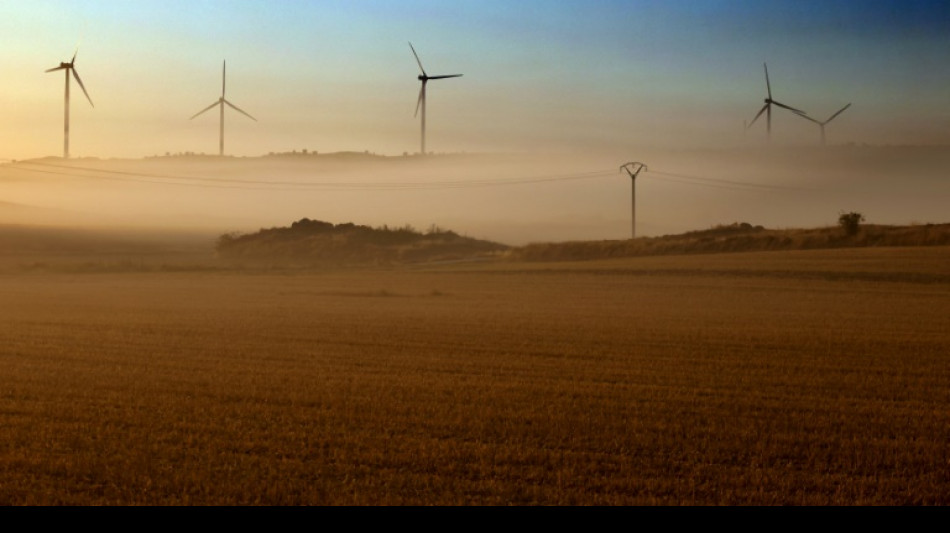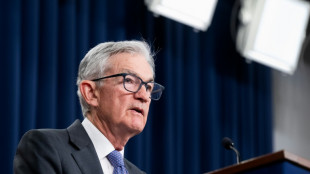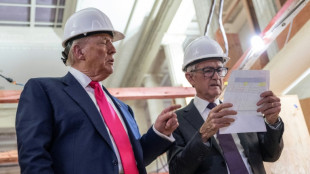
-
 Trump says US will take Greenland 'one way or the other'
Trump says US will take Greenland 'one way or the other'
-
Asian equities, precious metals surge as US Justice Dept targets Fed

-
 Myanmar pro-military party claims Suu Kyi's seat in junta-run poll
Myanmar pro-military party claims Suu Kyi's seat in junta-run poll
-
Fed chair Powell says targeted by federal probe

-
 Trailblazing Milos Raonic retires from tennis
Trailblazing Milos Raonic retires from tennis
-
Australia recalls parliament early to pass hate speech, gun laws

-
 'One Battle After Another,' 'Hamnet' triumph at Golden Globes
'One Battle After Another,' 'Hamnet' triumph at Golden Globes
-
Japan aims to dig deep-sea rare earths to reduce China dependence

-
 Top UN court to hear Rohingya genocide case against Myanmar
Top UN court to hear Rohingya genocide case against Myanmar
-
US sends more agents to Minneapolis despite furor over woman's killing

-
 Trump says Iran 'want to negotiate' after reports of hundreds killed in protests
Trump says Iran 'want to negotiate' after reports of hundreds killed in protests
-
Bangladesh's powerful Islamists prepare for elections

-
 NBA-best Thunder beat the Heat as T-Wolves edge Spurs
NBA-best Thunder beat the Heat as T-Wolves edge Spurs
-
Ukraine's Kostyuk defends 'conscious choice' to speak out about war

-
 Trump says working well with Venezuela's new leaders, open to meeting
Trump says working well with Venezuela's new leaders, open to meeting
-
Asian equities edge up, dollar slides as US Fed Reserve subpoenaed

-
 Hong Kong court hears sentencing arguments for Jimmy Lai
Hong Kong court hears sentencing arguments for Jimmy Lai
-
Powell says Federal Reserve subpoenaed by US Justice Department

-
 Chalamet, 'One Battle' among winners at Golden Globes
Chalamet, 'One Battle' among winners at Golden Globes
-
Turning point? Canada's tumultuous relationship with China

-
 Eagles stunned by depleted 49ers, Allen leads Bills fightback
Eagles stunned by depleted 49ers, Allen leads Bills fightback
-
Globes red carpet: chic black, naked dresses and a bit of politics

-
 Maduro's fall raises Venezuelans' hopes for economic bounty
Maduro's fall raises Venezuelans' hopes for economic bounty
-
Golden Globes kick off with 'One Battle' among favorites

-
 Australian Open 'underdog' Medvedev says he will be hard to beat
Australian Open 'underdog' Medvedev says he will be hard to beat
-
In-form Bencic back in top 10 for first time since having baby

-
 Swiatek insists 'everything is fine' after back-to-back defeats
Swiatek insists 'everything is fine' after back-to-back defeats
-
Wildfires spread to 15,000 hectares in Argentine Patagonia

-
 Napoli stay in touch with leaders Inter thanks to talisman McTominay
Napoli stay in touch with leaders Inter thanks to talisman McTominay
-
Meta urges Australia to change teen social media ban

-
 Venezuelans await political prisoners' release after government vow
Venezuelans await political prisoners' release after government vow
-
Lens continue winning streak, Endrick opens Lyon account in French Cup

-
 McTominay double gives Napoli precious point at Serie A leaders Inter
McTominay double gives Napoli precious point at Serie A leaders Inter
-
Trump admin sends more agents to Minneapolis despite furor over woman's killing

-
 Allen magic leads Bills past Jaguars in playoff thriller
Allen magic leads Bills past Jaguars in playoff thriller
-
Barca edge Real Madrid in thrilling Spanish Super Cup final

-
 Malinin spearheads US Olympic figure skating challenge
Malinin spearheads US Olympic figure skating challenge
-
Malinin spearheads US figure Olympic figure skating challenge

-
 Iran rights group warns of 'mass killing', govt calls counter-protests
Iran rights group warns of 'mass killing', govt calls counter-protests
-
'Fragile' Man Utd hit new low with FA Cup exit

-
 Iran rights group warns of 'mass killing' of protesters
Iran rights group warns of 'mass killing' of protesters
-
Demonstrators in London, Paris, Istanbul back Iran protests

-
 Olise sparkles as Bayern fire eight past Wolfsburg
Olise sparkles as Bayern fire eight past Wolfsburg
-
Man Utd knocked out of FA Cup by Brighton, Martinelli hits hat-trick for Arsenal

-
 Troubled Man Utd crash out of FA Cup against Brighton
Troubled Man Utd crash out of FA Cup against Brighton
-
Danish PM says Greenland showdown at 'decisive moment' after new Trump threats

-
 AC Milan snatch late draw at Fiorentina as title rivals Inter face Napoli
AC Milan snatch late draw at Fiorentina as title rivals Inter face Napoli
-
Venezuelans demand political prisoners' release, Maduro 'doing well'

-
 'Avatar: Fire and Ashe' leads in N.America for fourth week
'Avatar: Fire and Ashe' leads in N.America for fourth week
-
Bordeaux-Begles rout Northampton in Champions Cup final rematch


World near positive 'tipping point' on climate solutions: expert
With climate-enhanced droughts, heatwaves and fires ravaging three continents and the threat of a new surge in global warming, the world urgently needs to ramp-up solutions for slashing carbon pollution. But which solutions are most critical?
The organisation Project Drawdown has detailed the potential, feasibility and cost of nearly a hundred climate solutions since it was set up in 2017.
Executive director Jonathan Foley, a leading climate scientist, spoke to AFP about how to assess and prioritise the actions needed to keep Earth liveable.
The following interview has been edited for length and flow:
Q: What are the three most important questions in assessing the usefulness and integrity of carbon-cutting solutions?
A: Is it available now and ready to deploy? Because we need to start bending the emissions curve immediately.
Is it cost-effective? Otherwise, it's not going to scale effectively.
Does it create co-benefits for people, especially in terms of health, jobs, equity, and justice? This will make it far more appealing.
Q: A lot of hope -- and investment -- is going into technological solutions such as filtering fossil fuel pollution or pulling CO2 out of the air. Comment?
A: While some very limited carbon removal will be needed by mid-century, the vast, vast majority of the work we need to do -- more than 95 percent -- is cutting emissions, and doing it now.
Of the five percent focused on carbon removal, I think it should be more than 90 percent nature-based removal, such as ecological restoration and regenerative agriculture. Machine-based removal is unlikely to work at any meaningful scale.
Q: We often hear that solutions are already available, all that's missing is political will. Is that it?
A: It's not political will. It's money and power, which right now is still with fossil fuels, polluting industries, and unsustainable agriculture. That's why too many politicians are still in bed with them.
But effective climate solutions are here, now, and they are starting to growing exponentially and beat the older, polluting systems at their own game -- in the marketplace. When renewables and other climate solutions are cheaper, better, faster, and more popular than the old systems, we will hit a dramatic tipping point on climate solutions. We are getting close to that now. It's finally a real race.
Q: Government, business, consumers -– who's not pulling their weight on climate action?
A: The climate crisis will be changed in culture and business and technology, not politics. Governments aren't leading, not at all. At best, they're followers.
Government regulation has been a very small contributor. So far, businesses and communities are leading on climate action. We have already seen dramatic reductions in emissions -- 20 percent in the US since peaking in 2007, and 40 percent since the mid-1990s in the UK -- in major economies around the world, fuelled by changes in technology, business, investment, and culture.
Activists have also contributed to these positive changes, largely pushing how businesses and investors see the climate problem.
Q: Is greenwashing the new climate denial?
A: Sadly, yes. Outright denial of climate change as an issue is no longer credible. So the new approach is focused on delay and greenwashing -- making it look like we are doing things, but nothing really changes. One could also say delay is the new denial.
But we should also be aware of "doom-washing": the narrative that nothing good is happening on climate change and that we have no hope to stop the climate crisis. Neither of these is true.
Q: Is mainstream media conveying the balanced portfolio of climate action needed?
A: No. Far too much of the coverage is focused on the problem and impacts of climate change -- roughly 99 percent in the US media -- and almost nothing focusing on the solutions.
Mainstream media is doing more harm than good in some cases by promoting more fear and anxiety, leading to disengagement and inaction. This feeds a terrible feedback loop in our broken politics and activists cultures. We need a better, more balanced conversation on how climate solutions can benefit communities around the world.
A.AbuSaada--SF-PST



